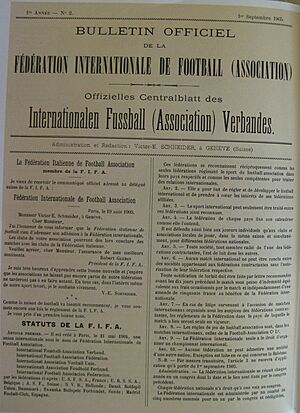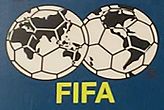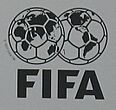History of FIFA facts for kids
FIFA (which stands for Fédération Internationale de Football Association) is a big international group that runs the sports of association football (soccer), futsal, and beach soccer around the world. It's one of the oldest and largest non-profit organizations, started way back on May 21, 1904. Since then, it has grown to include 211 member countries!
Contents
How FIFA Started
Football began to grow in popularity in the late 1800s. The very first official match between two countries happened in 1872 between England and Scotland in Glasgow. It was a 0-0 draw! The next year, England won 4-2 against Scotland. Soon after, Scotland formed its own football association in 1873. Before this, the Football Association in England was the only group making rules for football, which was mostly played in the United Kingdom.
As more countries started playing football and having matches against each other, people realized they needed a worldwide group to manage the sport. At first, they wanted the British football associations to lead this new group because they had started the game. However, the British groups said no.
So, countries in Europe decided to create their own organization. This is how FIFA was born in Paris on May 21, 1904. The founding countries were France, Belgium, Denmark, Netherlands, Spain, Sweden, and Switzerland. Germany also joined on the same day by telegram.
The first rules for FIFA said things like:
- Only official national football associations would be recognized.
- Players could only play for two national associations at a time.
- All associations had to agree to ban a player if another association banned them.
- Games had to follow the "Laws of the Game" from the English Football Association.
- Each national association had to pay a yearly fee.
- Only FIFA could organize international matches.
These rules started on September 1, 1905. The first FIFA meeting was held on May 23, 1904. Robert Guérin was chosen as the first president.
Early on, FIFA tried to organize a big tournament, but it didn't work because the British countries weren't involved. However, England joined FIFA on April 14, 1905. In 1906, Daniel Burley Woolfall became president and worked to make the rules of the game the same everywhere.
FIFA continued to grow, becoming the main group for international football matches. But it was still the English Football Association that organized the football tournaments at the 1908 and 1912 Olympic Games. Great Britain won both of these.
In 1909, South Africa became the first non-European member. Argentina and Chile joined in 1912, and the United States and Canada joined in 1913, just before World War I.
Between the World Wars
During World War I, international football matches were rare. FIFA almost fell apart after President Woolfall died in 1918. Luckily, Carl Anton Wilhelm Hirschmann worked hard, almost by himself, to keep FIFA going. In 1919, he called a meeting in Brussels. However, the British associations (England, Ireland, Scotland, and Wales) left FIFA because they didn't want countries from the losing side of the war to be included. They rejoined in the early 1920s but left again in 1928 due to disagreements about paying amateur players. They didn't come back until after World War II. In 1920, Jules Rimet from France became chairman, and then president in 1921.
FIFA started organizing football tournaments for the Olympic Games. In 1924, 60,000 fans watched the final at the 1924 Summer Olympics between Uruguay and Switzerland.
Because these tournaments were so successful, FIFA decided to create its own World Championship. This decision was made at a meeting in Amsterdam on May 28, 1928. The plans were finalized at a later meeting in Barcelona. The first World Cup would be held in Uruguay in 1930, as Uruguay was celebrating 100 years of independence. Unfortunately, Europe was going through tough economic times, and teams would have to be away from home for two months. Because of this, several European countries decided not to send their teams. So, the first World Cup started in Montevideo on July 18, 1930, with only four European teams.
After not hosting the first tournament, Italy was chosen for the 1934 World Cup. All matches were played in one country, which meant some teams traveled a long way just for one qualifying game. The final, won by the Italians, was the first to be broadcast live on radio. Italy won the next World Cup too, in France, before World War II began.
Growing After the War
In 1946, the four British nations rejoined FIFA. On May 10, 1947, a special "Match of the Century" was played between Great Britain and a "Rest of Europe" team in Glasgow. 135,000 people watched Britain win 6-1! The money from this match, about £35,000, was given to FIFA to help it get back on its feet after World War II. After this, FIFA held its first post-war World Cup in 1950 in Brazil. FIFA kept growing, and by its 50th anniversary, it had 84 member countries.
The 1950s and 1960s
In 1954, Jules Rimet was replaced by Rodolphe William Seeldrayers from Belgium. Seeldrayers passed away the next year, and Arthur Drewry from England took over. He also had a short time as president and was replaced in 1961 by Sir Stanley Rous, who used to be a referee. During Sir Stanley Rous's time as president, football continued to spread, and the World Cup was shown on television for the first time. He helped make the World Cup one of the biggest international sports events, almost as famous as the Olympic Games. However, his time was also a bit controversial because he supported a country that had unfair rules for its citizens, and he wanted them to play in the World Cup even though they had been banned by other football groups. This caused some tension between Rous and many FIFA groups.
Havelange's Time as President
Sir Stanley Rous was replaced in 1974 by João Havelange from Brazil. During his presidency, FIFA became much more focused on business and making money. He increased the number of teams in the World Cup to 24 for the 1982 World Cup and then to 32 for the 1998 World Cup. He also helped countries like Israel join international football and saw FIFA spread all over the world, with small nations like Guam, Lesotho, and Montserrat becoming members.
The New Millennium
The next president, Sepp Blatter, continued this growth. For example, he promised the 2010 World Cup to Africa. He led FIFA as it became a huge organization with a big impact on the world's economy and politics.
In 2006, after a game between Switzerland and South Korea, South Korean access to the FIFA website was blocked. There was a rumor in Korea that if they sent 500 million protest notes to FIFA, Switzerland's victory might be canceled. Because so many Korean users tried to access the site at once, it caused problems, and FIFA eventually stopped Korean access.
FIFA's Rules on Altitude for Games
FIFA tried to deal with the issue of playing football at very high altitudes in May 2007. They made a rule that no future international matches could be played higher than 2500 meters (about 8200 feet) above sea level.
This rule would have greatly affected countries in the Andes mountains. For example, Bolivia would not be able to play international matches in La Paz (which is 3600 meters high). Ecuador couldn't play in Quito (2800 meters), and Colombia couldn't play in Bogotá (2640 meters).
However, FIFA quickly changed its mind after many countries complained. Under pressure from South American football groups, they first increased the maximum altitude to 2800 meters (about 9190 feet) in June 2007. This meant Bogotá and Quito could host games again. Then, in July 2007, they removed the restriction for La Paz completely.
Some FIFA logos through history
List of Presidents of FIFA
Since it started in 1904, FIFA has had eight presidents:
| No. | President | Nationality | Presidency |
|---|---|---|---|
| 1 | Robert Guérin | 1904–1906 | |
| 2 | Daniel Burley Woolfall | 1906–1918 | |
| – | Cornelis Hirschman (acting) | 1918–1921 | |
| 3 | Jules Rimet | 1921–1954 | |
| 4 | Rodolphe Seeldrayers | 1954–1955 | |
| 5 | Arthur Drewry | 1955–1961 | |
| 6 | Sir Stanley Rous | 1961–1974 | |
| 7 | Dr João Havelange | 1974–1998 | |
| 8 | Sepp Blatter | 1998–2015 | |
| – | Issa Hayatou (acting) | 2015–2016 | |
| 9 | Gianni Infantino | 2016–present |
List of Secretaries General of FIFA
FIFA has had nine secretaries general since it was founded in 1904:
| Secretary general | Nationality | Term |
|---|---|---|
| Louis Muhlinghaus | 1904–1906 | |
| Cornelis August Wilhelm Hirschman | 1906–1931 | |
| Ivo Schricker | 1932–1951 | |
| Kurt Gassmann | 1951–1960 | |
| Helmut Käser | 1961–1981 | |
| Sepp Blatter | 1981–1998 | |
| Michel Zen-Ruffinen | 1998–2002 | |
| Urs Linsi | 2002–2007 | |
| Jérôme Valcke | 2007–2015 | |
| Markus Kattner (acting) | 2015–2016 | |
| Fatma Samoura | 2016–2023 | |
| Mattias Grafström (acting) | 2024–present |
See also
 | Percy Lavon Julian |
 | Katherine Johnson |
 | George Washington Carver |
 | Annie Easley |





